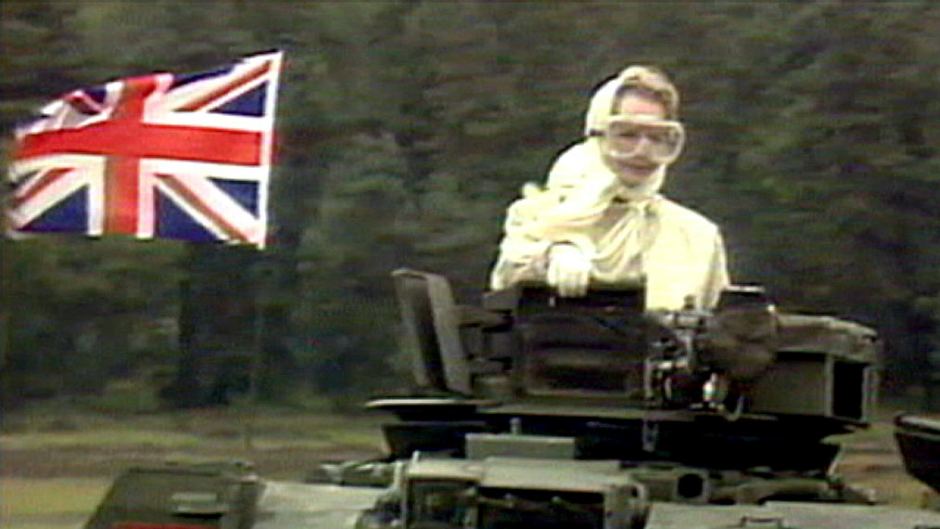For me, the holiday season doesn’t end with a hangover on New Year’s Day. It gets extended a bit for us historians because every January the British government releases previously classified documents from 30 years earlier. The so-called “30-year rule” protects bureaucrats and politicians from the wrath of the voter, but they don’t get to escape the judgment of history, or at least of historians. Since this is 2014, we now have access to the secrets of 1984, a year in British history most noted for a horrible coal miners’ strike, an assassination attempt on Prime Minister Thatcher by the Irish Republican Army, and the murder of a London police officer by Libyan diplomats who got away with it.
The 1984 miners’ strike is probably best known in America as the backdrop to the film and play “Billy Elliot.” It was a year-long walkout by coalminers who were trying to save their jobs, their industry and their communities from Mrs. Thatcher’s plans to close all the mines that weren’t profitable regardless of the social cost. At the time, union leader Arthur Scargill was slammed as a “soft-headed rabble-rouser” for claiming the government wanted to close as many as 20 mines. Papers released last week show the government was targeting 75.
Read more: WILD MUSLIM WRITER AMER MADHANI ON CANNIBALISM: THE FAMILY THAT EATS TOGETHER?
The papers show a Cabinet that felt it was staring “into the abyss” and one minister wrote “time is not on our side.” The railway unions were helping the miners by slowing the delivery of coal to power plants. The Thatcher government, which had been elected in 1979 after a Labour government couldn’t control the unions, drew up plans to use troops to move coal — 4,500 drivers and 1,650 government trucks could move 100 kilotons of coal a day.
When the dockers also went out on strike, a similar plan to deal with them was drawn up. At one stage, the agriculture minister told Mrs. Thatcher that Britain had 10 days’ of food available, and panic buying might reduce that. In the end, the government felt that calling out the troops would be too great a public relations disaster and never actually did it. What changed Mrs. Thatcher’s mind, though, were the assurances of the head of the Coal Board that the power plants had enough coal stockpiled to last through November 1985.
Northern Ireland was a huge problem for British governments, either Tory or Labour, since the Troubles began in the late 1960s. Mrs. Thatcher and her Irish counterpart, Garret Fitzgerald, had been negotiating in secret through lower-level bureaucrats since early 1984, and there was even a suggestion in London to partition Northern Ireland between Protestants and Catholics. In October, the Conservative Party held its annual autumn conference in Brighton, and the I.R.A. managed to bomb the Grand Hotel where the top Tories stayed. Five people, including Sir Anthony Berry (a member of Parliament), died in the blast, and the PM herself was in her room when the bomb exploded.
Read more: THE PANAMA PAPERS SENSATION, AN IDIOTIC INSULT TO EIGHT MILLION AMERICAN EXPATRIATES
She wrote, “The events of Thursday night at Brighton mean that we must go very slow on these talks, if not stop them. It would look as if we were bombed into making concessions to the Republic.” In another note, she said, “The bomb has slowed things down and may in the end kill any new initiative.” Nevertheless, the Anglo-Irish agreement was signed in November 1985 — we’ll see the papers on that later.
Libya had supplied the I.R.A. with weapons for years, but in 1984, Muammar Gaddafi tried to improve ties with the Brits. However, his government murdered Libyan exiles and journalists in the U.K., and his diplomatic efforts went nowhere. So, he decided to start arming the I.R.A. again. Libyan exiles staged protests against Gaddafi. One was scheduled for April 17, and the British government was warned twice by the Libyan government that the Gaddafi government “would not be responsible for the consequences if the demonstration took place and that might include violence.” The demonstration went ahead, and automatic weapons fire came from the embassy, hitting 11 protesters and Yvonne Fletcher, a woman police constable. She died that afternoon in the hospital.
Read more: LAURA K. FURGIONE, RACIST WEATHER WOMAN IMPLICATED IN NEW LOIS LERNER CHINA SPY SCANDAL
The embassy in London was surrounded, and the Libyans responded with threats to burn down the U.K. embassy in Tripoli. Mrs. Thatcher accepted that she’d have to let “a murderer go free” to diffuse the situation, as those in the embassy had diplomatic immunity. After 11 days, the entire staff of the embassy went to Heathrow and flew home. No one has ever been prosecuted for the crime.
The Iron Lady had a few more years in office ahead of her, but 1984 was the critical year of her time at Number 10 Downing Street. The Falklands War in 1982 secured her an election victory in 1983 that she likely would have lost otherwise, but 1984 saw the last real challenge to her position. Defeating the miners meant an end to any opposition from Labour, the unions or even the electorate. She finally fell from power when her own MPs turned on her. We’ll have to wait until the papers for 1990 come out to see how that really happened.







One Comment
Leave a Reply